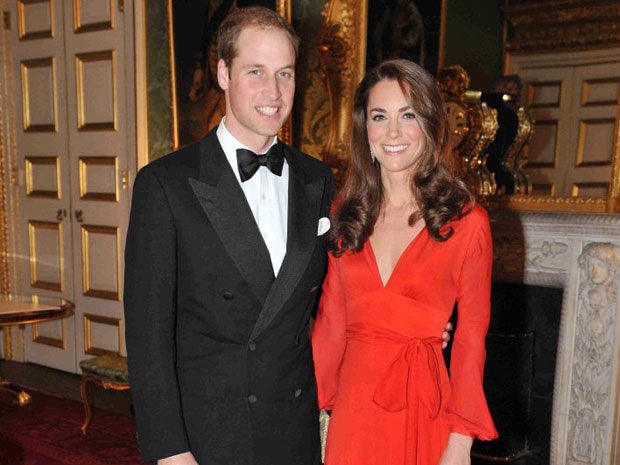Royal women to get equal rights

Your support helps us to tell the story
From reproductive rights to climate change to Big Tech, The Independent is on the ground when the story is developing. Whether it's investigating the financials of Elon Musk's pro-Trump PAC or producing our latest documentary, 'The A Word', which shines a light on the American women fighting for reproductive rights, we know how important it is to parse out the facts from the messaging.
At such a critical moment in US history, we need reporters on the ground. Your donation allows us to keep sending journalists to speak to both sides of the story.
The Independent is trusted by Americans across the entire political spectrum. And unlike many other quality news outlets, we choose not to lock Americans out of our reporting and analysis with paywalls. We believe quality journalism should be available to everyone, paid for by those who can afford it.
Your support makes all the difference.Prince William's first child will follow him on to the throne whether it is a girl or a boy, after agreement was reached today on historic constitutional changes to end gender discrimination in the rules of succession.
The 16 Commonwealth nations of which the Queen is monarch agreed unanimously to end the rule of primogeniture, under which a younger son takes precedence over older sisters in the order of succession.
The 16 "realms", including the UK, Australia and Canada, also agreed to scrap centuries-old laws which ban the spouse of a Roman Catholic from ascending to the throne.
Announcing the changes at a Commonwealth summit in Australia, Prime Minister David Cameron said the "outdated" rules were "at odds with the modern countries that we have become".
Explaining how the rules on succession will change, he said: "Put simply, if the Duke and Duchess of Cambridge were to have a little girl, that girl would one day be our queen."
Reform of the succession rules, which date back to the 17th century, has long been seen as overdue in an age of greater equality between genders and faiths.
But pressure for change became more urgent following the marriage of Prince William and Catherine Middleton in April, which raised the prospect of new additions to the line of succession in the near future.
Putting future princesses on an equal footing with their brothers will require amendments to a raft of historic legislation, including the 1701 Act of Settlement and 1689 Bill of Rights, as well as laws in a number of the Queen's other realms.
Any legislative changes will apply to the heirs of the Prince of Wales, so the children of William and Catherine will be affected whether or not they are born before the process of amending laws is completed. However, Princess Anne will not leapfrog her younger brothers to become fourth in line to the throne.
Mr Cameron made clear that although heirs to the throne will in future be allowed to marry Roman Catholics, the ban on a Catholic becoming sovereign will remain.
"The monarch must be in communion with the Church of England because he or she is the head of that church," he said.
"But it is simply wrong that they should be denied the chance to marry a Catholic if they wish to do so."
Mr Cameron added: "The great strength of our constitutional approach is its ability to evolve.
"Attitudes have changed fundamentally over the centuries and some of the out-dated rules - like some of the rules of succession - just don't make sense to us any more.
"The idea that a younger son should become monarch instead of an elder daughter simply because he is a man, or that a future monarch can marry someone of any faith except a Catholic - this way of thinking is at odds with the modern countries that we have become."
His announcement was welcomed by the head of Roman Catholics in England and Wales, Archbishop of Westminster Vincent Nichols, who said the reform would "eliminate a point of unjust discrimination against Catholics".
Australian PM Julia Gillard, who is hosting the Commonwealth Heads of Government Meeting in Perth, welcomed the changes "as a Prime Minister and as a woman".
"Just because they seem straightforward to our modern minds doesn't mean that we should underestimate their historical significance, changing as they will for all time the way in which the monarchy works," she said.
Canadian Prime Minister Stephen Harper said: "Canada supports these reasonable modernisations that will help the Crown to remain an institution that reflects the values of Canadians."
But Graham Smith, of the Republic campaign for an elected head of state, said: "The monarchy discriminates against every man, woman and child who isn't born into the Windsor family. To suggest that this has anything to do with equality is utterly absurd."
Mr Cameron chaired the meeting in Perth of the heads of government of the realms - the UK, Australia, New Zealand, Canada, Jamaica, Antigua and Barbuda, Belize, Papua New Guinea, St Christopher and Nevis, St Vincent and the Grenadines, Tuvalu, Barbados, Grenada, Solomon Islands, St Lucia and the Bahamas.
Any legislative changes will be implemented simultaneously by all 16 nations, though for historic reasons Britain must publish its plans first.
The Queen was represented in the meeting by her private secretary Sir Christopher Geidt, who was asked to advise her of their decision. Mr Cameron said that Her Majesty will play her normal role in giving Royal Assent to the legislation needed to effect the changes.
Buckingham Palace made no comment on the development, saying only that "it was entirely a matter for the 16 realms".
PA
Join our commenting forum
Join thought-provoking conversations, follow other Independent readers and see their replies
Comments